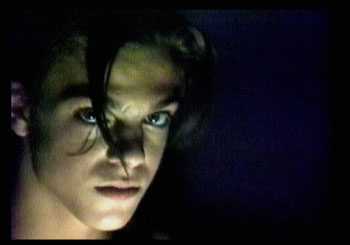
In 1973, influential filmmaker Jean Rouch wryly explained why he made documentaries about vanishing cultures: "Why do I take the camera among mankind? My first response will always, strangely, be the same: 'For me.'" Trained as an anthropologist, Rouch had a good many more reasons than that, but his statement was honest and philosophical. "Film," he added, "is the only means I have to show someone else how I see him." In the 1950s his embrace of new technologies — portable cameras and audio equipment — helped Rouch stand on the shoulders of Robert Flaherty (Nanook of the North) and Dziga Vertov (The Man with the Movie Camera), innovators who recognized in the earliest days of cinema that a camera has the potential to break down barriers between people, like a little machine that captures the truth, or at least something close to it.
Born in Houston a year before Rouch made that statement, Jonathan Caouette grew up with one of those machines at his side, and he hung onto it like a security blanket through his family's dark nights. Tarnation, the 90-minute film that he extracted from two decades of footage, tries to untangle his complicated past and get at something close to the truth. It's his own story — he was a troubled kid with abusive foster parents, a boy who made slasher movies with his friends and partied at adult clubs when he was a teen — but it's also the story of his mother and her mental illness and the story of his grandparents who raised him, intermittently, during his mother's extended hospital stays. Caouette now seems like someone coming up for air after a long, breathless struggle; Tarnation is his testament of survival.
The promise of personal video is that it'll put the power of moving images into the hands — and homes — of ordinary people. It's another frontier opened by technology, a place that cameras have, until now, been too bulky or too foreign to go unnoticed. Albert Brooks poked fun at the attempts to film domestic spaces in his hilarious first movie, Real Life, where men with cameras mounted on their heads lurk around Charles Grodin's dinner table as he tries to carry on a normal — quote unquote — conversation with his family. But since then cameras have become as familiar as socks in many American homes, and for kids like Jonathan, the camera has become a substitute for a leather-bound diary, trusty and worn, a keeper of secrets.
Although Tarnation may foreshadow a new era of personal filmmaking, it doesn't necessarily herald the coming of a great filmmaker. Caouette's 90 minutes are a jumbled mass of images, aligned in arbitrary grids and edited with little grace. Maybe the high-volume, monotonous pace mirrors Caouette's own inability to order his life and his own tendency toward melodrama, but his movie would benefit from a keener, more curious eye. Instead of using the grammar of cinema to tell his story, he relies on pages of scrolling text that read like the piteous scribbles of a teenager holed up in his room with the stereo blasting. The world's against me. Woe is me.
Granted, young Jonathan had plenty to be woeful about, but the movie is best when it slips quietly into the air pockets between his family's dramatic episodes, showing Caouette's natural, spooky talent for acting in the process. A monologue he delivers when he's surely not a whisker over 12, playing the part of a battered housewife, is as riveting as it is disturbing. He's acting for an audience of one, his camera, and although it's not the kind of scene that would be the heart of most movies, it might be the heart of this one. At that moment Tarnation is tensely electric and seemingly on the verge of fulfilling its promise by tapping into an unexplored vein of human experience.
But an older Caouette, the one who edited this movie and seems to be at the mercy of his flair for drama, eventually abandons this intimacy to cater instead to an irresistible new audience, one raised on ambush journalism and televised domestic disputes. When he confronts his family or puts them in awkward situations for the sake of a good scene, dutifully waiting for one party to stomp out of the room, his movie feels simply conventional. It's no longer "for me" or even "for us" but all too eager to evoke pity in an unseen third party; it's "for you," the audience who expects an emotional roller coaster. Over-extending, Caouette says — in text — that his mother was a beauty before her unnecessary shock treatments, as if they're that much worse for having spoiled her appearance. With backhanded sympathy like that, it's no wonder the movie wasn't released on Mother's Day.
The video revolution may indeed be televised, and the truth may be streamed at so many bits per second, but the technology alone won't be enough. It will require revolutionaries, filmmakers who are sensitive to the needs of images that are so intimate they can either crush or be crushed, so tenuously powerful that they're devastating only until someone tries to make them more so. Caouette's life is filled with extraordinary experiences, but extraordinary experiences are nothing new to the movies. The ordinary ones, the ones that the tiny ubiquitous cameras have the greatest potential to reveal, remain, for the time being, elusive.
